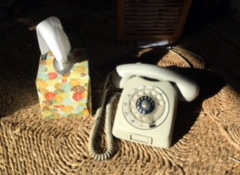
The Wind Telephone
The Wind Telephone
There are things I never had an opportunity to say to Dad before he died. From my shock of discovering that he was at the attack of Pearl Harbor, to our mutual love of the rugged Sierra Nevadas, what I am unable to ask, haunts me. These are the rocks that sit in my stomach, sharp and unforgiving, day after day. So I write.
I had assumed that once my book was accepted for publication, this wouldn’t matter. The truth would soon be out. But while there has been healing in writing my story, there are still important things that remain unsaid and unanswered. So that explains why I sat transfixed while on a recent writing retreat, as my mentor, Laura Davis explained that two “wind telephones” had been installed for us to use in different locations on the property. They could be used anytime for anyone to call a loved one, to say what needed to be said.
Wind telephones? This concept was born after the horrific 2011 tsunami hit Japan’s northeastern coast. In the US I had mostly heard news about the triple meltdown at the Fukushima Daiichi nuclear plant. But I never knew about the nearby town of Otsuchi, where those 30-foot waves smacked down everything in their path, sweeping 16,000 people to their deaths. In some cases, whole families were lost. How do people cope with grief on such a grand scale?
Enter a 70-year old Japanese gardener, Itaru Sasaki, who, overcome with the loss of his beloved cousin, decided to place a phone booth in his garden, as a way talk to him. “Because my thoughts couldn’t be relayed over a regular phone line,” Itaru Sasaki explained to Japanese TV channel NHK Sendai, “I wanted them to be carried on the wind.” In the past six years since the tsunami, Itaru’s wind telephone has been used by thousands of people making a pilgrimage there – as a way of coping with their loss. They simply enter the booth, pick up the receiver, and talk. The footage of this can be seen on Youtube, and I’ll be damned if it doesn’t take your breath away to see people pour out their heart, gripping that receiver. But could I do this?
Early the next morning, before I could talk myself out of it, I hiked to one of the wind telephones. It had been placed in a small wooden meditation hut that overlooked the Pacific Ocean. I wasn’t sure what would happen once I opened that door. Would I flee? Could I say the words I needed to say?
When I stepped inside, my breath caught, and I sank to my knees, facing the window that overlooked the ocean. Little trinkets lined the walls – gifts for loved ones left by the living: Feathers, beautiful rocks, notes carefully tucked into the wall boards. This place was sacred, and I suddenly knew what I had to do.
The wind telephone was waiting on the far wall, alongside a box of tissues. I stared at that beige rotary phone, laughing a little at life, and at this relic of the past. So much had happened since this object was in most of our homes. Yet in its familiar shape, I found a kind of certainty about who I once was. I found comfort: Calling my grandparents on Sundays; dialing my best friend to see if she could play; whispering into the receiver to my sister KK, filling her in on all the gory details.
I reached out and lifted the receiver – it felt good in my hand, and looking down at the round dial with the aging numbers, I took a breath and dialed Dad’s phone number.
3 Comments
Leave a Comment
You must be logged in to post a comment.
Vanya, I love that the wind telephones have made it into print. I was waiting to hear all about your conversation, but I guess I’ll have to listen on the wind.
Beautiful … I heard about that wind tele .. Iam grateful we can find tools to use for our grief…it all helps . Thank you for this story and I honor your path and commitment to recover.
Marni
whoa. I heard about this offering. Now I can see it, understand the power of a prop to open up the link to what one is called to say. More please